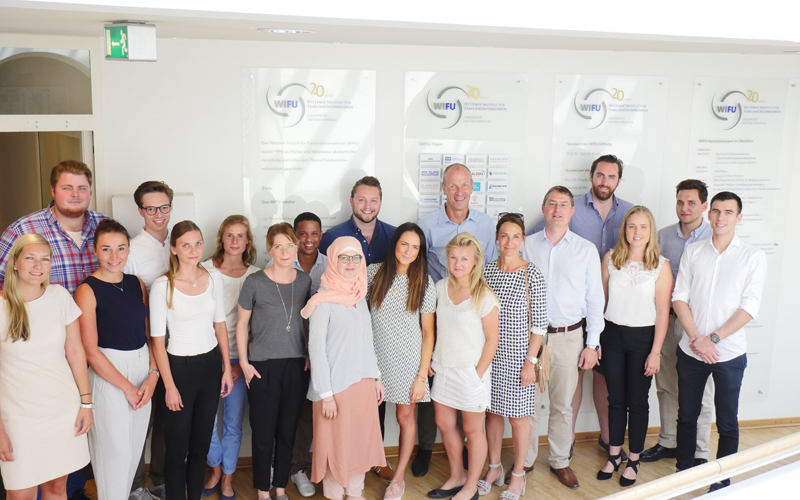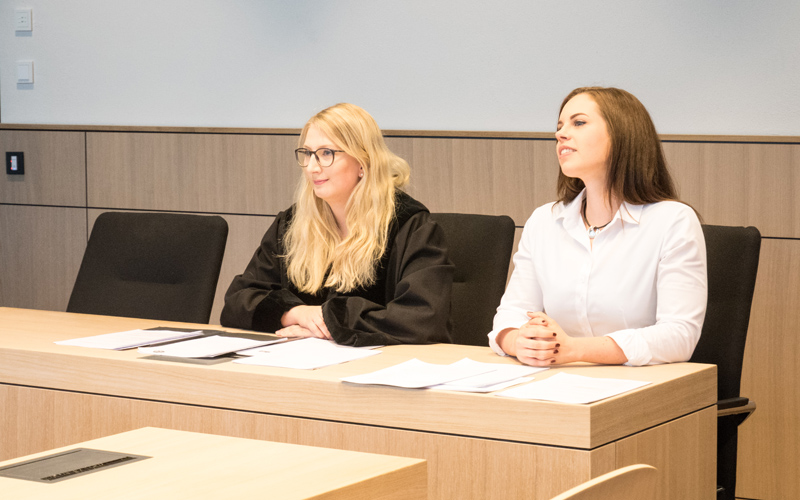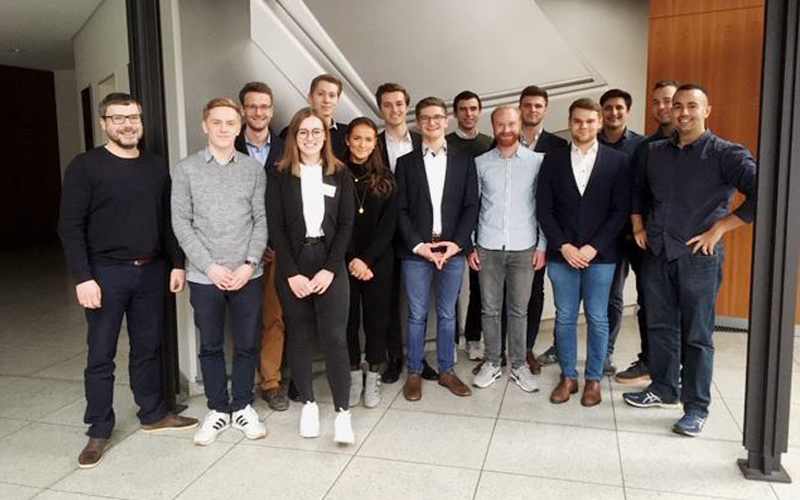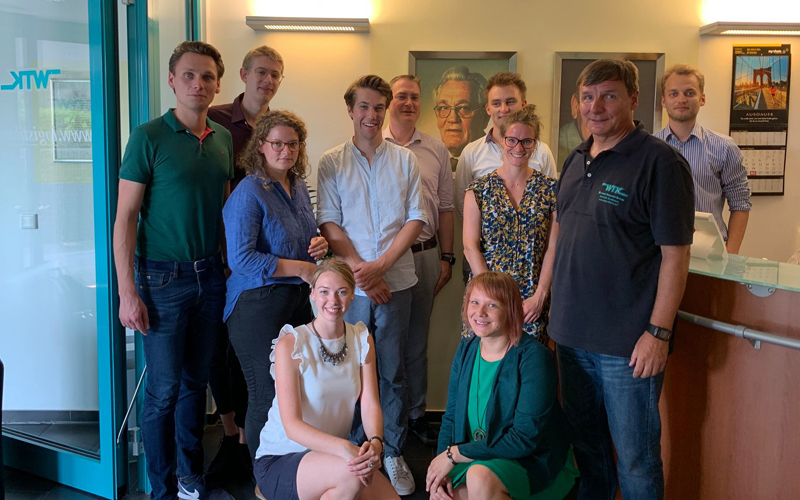Short description: The course provides an overview of the peculiarities and dynamics of family businesses as a distinct type of business. For participation in a family business or succession in the management task of a family business, it is essential to recognise in which form the ‘family factor’ of the family business is relevant. First, students will be given a multi-perspective insight into the interrelations between the spheres of influence of the family, the circle of partners and the firm. Based on the theoretical content conveyed, the concepts learned will then be applied practically using a case study and critically discussed with a representative from a business family.
Responsible lecturer: Prof. Dr. Tom A. Rüsen
Frequency/ Duration: Summer semester
THE WIFU OFFERS A UNIQUE RANGE OF STUDIES IN THE GERMAN-SPEAKING AREA
From bachelor’s to master’s degrees to PhD/habilitation, our range of courses covers the entire university educational career. We offer the opportunity to acquire in-depth, practical knowledge on the subject of family businesses to both business administration students and non-specialist students. Practical relevance is achieved through a unique network of family businesses and family business researchers that has evolved over two decades. This opens up a variety of career opportunities for our graduates in the field of family business studies.
Our courses examine family entrepreneurship from various angles:
- Business administration (e.g. strategy development)
- Psychology/sociology (e.g. psychology of succession)
- Law (e.g. tax law in family businesses)
This allows our students to gain a transdisciplinary, holistic view of the world’s most important form of business organisation.
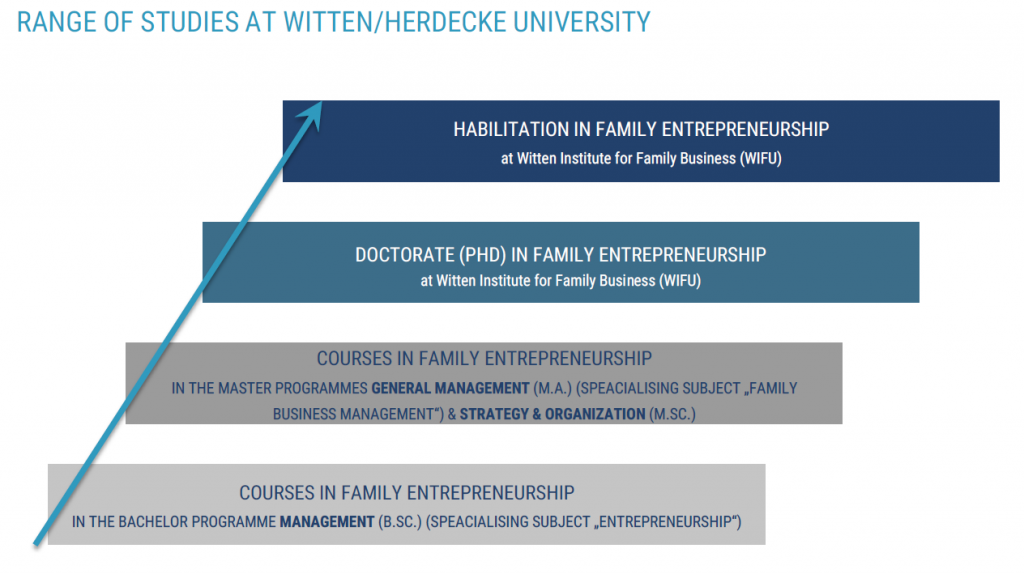
BACHELOR OF CHOICE
Starting in the winter semester of 2023/2204, Witten/Herdecke University will offer a new study concept at the Faculty of Business, Economics and Society. Students will have to make a final decision on one of five bachelor’s degree programmes only after the joint orientation year. The choices are Management; Philosophy, Politics and Economics; and the new degree programmes are Economics, Politics and Law; Global Sustainability: Climate, Justice, Transformation; and Social Data Science.
All information on the Bachelor of Choice can be found here:
BACHELOR OF SCIENCE (B.SC.) SPECIALISING IN ENTREPRENEURSHIP
Students enrolled in our bachelor’s degree (BSc) programmes have the option to take seminars on family businesses as part of the specialising subject of Entrepreneurship. Building on Tagiuri and Davis’s three-circle model (family, business and ownership), the seminars Grundlagen des Familienunternehmens (Fundamentals of the Family Business); Psychologie der Familienunternehmen (Psychology of Family Businesses; and Rechtliche Grundlagen von Familienunternehmen (Legal Fundamentals of Family Businesses), provide necessary skill sets. These foundations are supplemented by important entrepreneurial competencies in further seminars. Topics include technology, digitisation and innovation management, and business model innovation.
All courses offered by WIFU lecturers as part of the bachelor’s degree programme for Management (BSc) are listed in UWE:
WIFU-Courses as part of the Bachelor’s Degree
Programme “Management (B.Sc.)”
Short description: In order to understand family businesses, classical business models, theories and findings should be extended to include psychological and other sociological (e.g. pedagogical) perspectives. Indeed, families that play a decisive role in this form of business are supported by their members’ strong emotional ties; for example, between couples, children and parents. This can be beneficial for family businesses but can also be a risk factor. In this seminar, we will look at the opportunities and threats of familial dynamics for family businesses, especially from a sociopsychological and sociological point of view.
Responsible lecturer: Prof. Dr. Heiko Kleve
Frequency/ Duration: Winter semester
Short description: As an introduction to general tax law, the following topics will first be dealt with: legal forms and taxes at a glance, tax concepts and types of taxation, sources of tax law, principles of tax law and basic principles of procedural law. An introduction to corporate tax law with the following focal points will follow: the nature of corporate income tax, personal tax liability, objective tax liability, the beginning of corporate income tax liability, taxation procedures and fiscal unity. A subsequent introduction to income tax law covers the basics, various types of income, types of income and the determination of profits in the entrepreneurial field. Finally, the course will examine the topic of trade tax (overview, trade income and tariffs).
Responsible lecturer: Prof. Rainer Kirchdörfer
Module coordinator: Prof. Dr. Christoph Schreiber
Frequency/ Duration: Summer semester
Short description: This module provides an overview of fundamental issues in the field of family business law. It deals with family law, inheritance law, corporate law and tax law. The discussions will take place both in a theoretical form and based on practical examples. In this way, the respective problems that occur in the most important case-forms within the respective legal fields will be clarified. The topics covered will include important contractual arrangements, liability issues, conflict avoidance and prevention in family businesses, financing issues and an overview of corporate succession.
Responsible lecturer: Dr. iur. Rainer Kögel
Module coordinator: Prof. Dr. Christoph Schreiber
Frequency/ Duration: Winter semester
Short description: Family law and inheritance law not only play key roles in business practice but also in family businesses. Succession models cannot be seriously thought through without basic knowledge in this area of law. The course aims to close this gap by providing an introduction to the subject matter and an overview of cross-references in tax law. The teaching content will be taught on the basis of practical cases.
Responsible lecturer: Prof. Dr. Christoph Schreiber
Frequency/ Duration: Summer semester
Short description: A start-up can be seen as a process encompassing the identification and assessment of opportunities, the procurement of relevant human and monetary resources, the establishment of an organisation and its management. In addition to theories and concepts, relevant practical methods and procedures that support this process will be taught. The theoretical elements and steps of starting a company will be illustrated and described in detail, and approaches for the implementation of a start-up project will be presented. Students will learn how to implement this content in a business plan and how to pitch it to potential investors and/or investors.
Responsible Lecturer: Prof. Dr. Thomas Clauß
Frequency/Duration: Summer semester
Short description: The module will teach the basics of technology and innovation management (TIM). Based on the basic models and theories, the methods and tools of TIM will be introduced. This conceptual part of the module will be followed by an operative and applied portion dedicated to the management of innovation projects, creativity techniques and business instruments of product development. Students will learn the general conditions and relevance of product management in the context of the platform economy and digital business models (smart products and services, and digital leadership) and master the basics and techniques of digital market research (design thinking, innovation labs, customer journeys and prototyping) and product development (Lean start-ups and Agile project management, such as Scrum and Kanban). From this, a strategic management approach to TIM will be developed.
Responsible Lecturer: Dr. Anne Katarina Heider
Frequency/ Duration: Winter semester
Short description: Building on the basic models and theories of innovation management, the methods and tools of agile project management will be introduced. This conceptual part of the module will be followed by an operational and applied portion dedicated to the management of innovation projects, creativity techniques and business instruments of product development. The students will learn the framework conditions and relevance of product management in the context of the platform economy and digital business models (smart products and services, and digital leadership). They will master the basics and techniques of digital market research (design thinking, innovation labs, customer journeys and prototyping) and product development (Lean start-ups and Agile project management, such as Scrum and Kanban).
Responsible Lecturer: Dr. Anne Katarina Heider
Frequency/ Duration: Summer semester
MASTER OF ARTS (M.A.) IN GENERAL MANAGEMENT SPECIALISING IN „FAMILY BUSINESS MANAGEMENT“
The master’s (MA) programme in General Management is aimed at students who are interested in family businesses and business families but who did not study economics in their bachelor’s degree programme. For instance, students with bachelor’s degrees in humanities, engineering or natural sciences will be taught basic management skills, allowing them to prepare for a management career in their own family business.
The specialising subject of Family Business Management focuses on the strategic management of the interface of business family and family business. Modules in this specialising subject include, among others, the theories of the business family, conflicts and conflict management in family businesses, crisis management, restructuring and redevelopment in family businesses, and the legal bases for the succession and strategies of family businesses.
MASTER OF SCIENCE (M.SC.) IN STRATEGY & ORGANISATION
The master’s (MSc) programme in Strategy and Organisation is aimed at students with a bachelor’s degree in economics and aspirations for a career in management or consulting. Building on the foreknowledge of the students and a strong scientific foundation, the current state of knowledge on strategic management and the designs of organisational structures and processes are conveyed. The subjects range from strategic decisions in internationalisation, brand management, CSR and ethical aspects to corporate culture, change management and innovative organisational structures. The special characteristics of family businesses are also addressed in this course. Moreover, special events relating to the field of study are offered. Study certificates can be acquired via the WIFU.
All courses offered by WIFU lecturers as part of master’s degree programmes are listed in UWE:
WIFU-Courses as part of the Master’s Degree Programmes “General Management (M.A.)” and “Strategy and Organization (M.Sc.)”
Short description: In this seminar, the basics and recent developments of the systemic theory of the business family and the family business will be presented and discussed based on practical examples. The starting point of the seminar is the thesis that families and businesses do not fit together structurally and with regard to their respective forms of communication. How such a fitting nevertheless contributes to the long life and endurance of successful family businesses is the central knowledge-guiding question of the course.
Lecturer: Prof. Dr Heiko Kleve
Responsible lecturer: Prof. Dr. Heiko Kleve
Frequency/ Duration: Summer semester
Short description: Family businesses represent a special context condition that can greatly increase the likelihood of conflicts. Once conflicts have been ignited, they are governed by their own psychological laws. By understanding these, one can better consider and work on the dynamics of family businesses.
Responsible lecturer: Prof. Dr. Arist von Schlippe
Frequency/ Duration: Winter semester
Short description: In this course, the essential steps for the restructuring and redevelopment of family businesses will be presented and tested in a case study under crisis-like conditions in small groups.
Responsible lecturer: Prof. Dr. Tom A. Rüsen
Frequency/ Duration: Winter semester
Short description: In the form of a case study dealing with succession in family businesses, the course will shed light on the inheritance law, corporate law, tax law and psychological problems of the succession process. The course will be held together with students of law from the University of Bayreuth (under Prof. Dr K.-W. Lange) and will, thus, have a special interdisciplinary character.
Responsible lecturer: Prof. Rainer Kirchdörfer / Prof. Dr. Christoph Schreiber
Frequency/ Duration: Summer semester
Short description: Systems theory is particularly suitable for describing and explaining family business dynamics, potentials and conflicts as well as for supporting family businesses through consulting and coaching. Both perspectives will be deepened in the seminar. The first part will develop a systemic understanding of this corporate form with regard to leadership and decision-making processes. Second, the systemic procedures, methods and techniques of consulting and coaching will be presented and practised, which can support actors within this form of business to design problematic leadership and decision-making situations appropriately. Responsible lecturer: Prof. Dr. Heiko Kleve
Frequency/ Duration: Winter semester
Short description: The module deals with current questions about transformation and business model innovation in family businesses. Current research questions are examined in this context together with students. Together we go through a prototypical research process starting with the theoretical foundation, the collection and empirical analysis of suitable data and the documentation of the study results.
Responsible lecturer: Prof. Dr. Thomas Clauß
Frequency/ Duration: Summer semester
Short description: This module examines business model innovations from a holistic perspective and their individual elements separately and based on theory. In addition, the methods for evaluating and developing business models will be taught. Students will be shown the essential theoretical elements of business models and their interactions as well as approaches for evaluation and development. Through an independent case analysis, students will gain the ability to analyse business models in practice and to develop and present design approaches for the change and management of business models.
Responsible lecturer: Prof. Dr. Thomas Clauß
Frequency/ Duration: Winter semester
Short description: This class focuses on the topic of corporate entrepreneurship, which refers to ways to build a new business from within an organisation. This includes starting new lines of business or new product units, setting up new practice areas, launching offices in new geographies, managing spin-offs and creating new joint ventures as well as establishing processes to ensure the successful development of new businesses. Exemplary case studies will be studied and discussed for a practical view of the theory. The topic of corporate entrepreneurship is especially important for students who expect to face future tasks related to change management, digital transformation, innovation and business model innovation within already established companies.
Responsible lecturer: Prof. Dr. Thomas Clauß
Frequency/ Duration: Summer semester
TARGET GROUP
Our bachelor (BSc) and master (MA/MSc) programmes are designed for students who wish to study the dynamics, interactions and challenges between family and business in family businesses. These include
- successors and potential shareholders of business families who wish to prepare themselves for future leadership roles
- future professionals and managers of family businesses who wish to help shape the development of their organisations from a position of responsibility
- persons striving to work as consultants in family businesses
- family-external managers and consultants who wish to acquire competencies in the field of family entrepreneurship.
The WIFU Graduate College is aimed at university graduates who are interested in transdisciplinary family business research and who are seeking a scientific career at home or abroad.
To promote young scientists, the WIFU Foundation awards two types of scholarships:
CAMPUSday
Our CAMPUSday gives you the opportunity to learn more about the courses of study offered at UW/H. In addition to our economics courses, information events about the degree programmes offered at the Faculty of Health and Culture are included.
MASTERday
Our MASTERday allows you to familiarise yourself with the different master’s programmes offered at the three faculties of UW/H. For economics studies, this includes General Management (MA), Strategy and Organisation (MSc) and Philosophy, Politics and Economics (MA).
DOCTORATE AND POSTDOCTORATE AT WIFU
Those interested in research can obtain a doctorate or habilitation in family business at the WIFU Graduate College. The central component of the Graduate College is the newly established WIFU Research Camp.
INFO
You will find detailed information and all the application documents and deadlines at the Witten/Herdecke University’s website:






